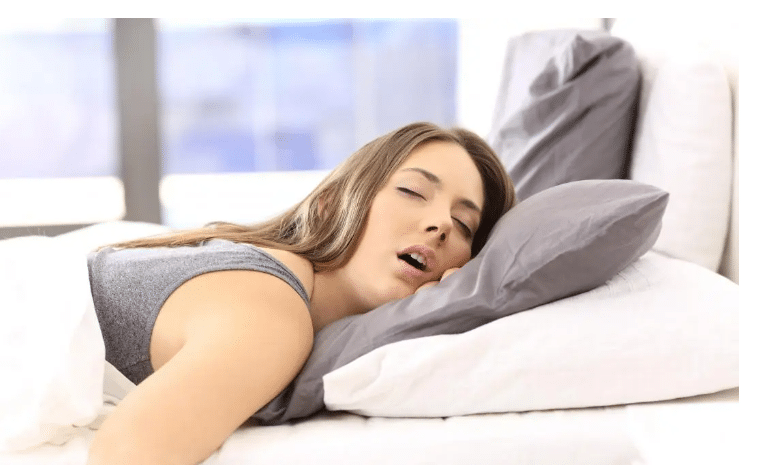Drooling in your sleep is a common yet often overlooked phenomenon. Many of us have woken up to an unmistakable wet patch on our pillow and wondered, “Why does this happen?” While occasional drooling is normal and harmless, excessive drooling can sometimes be a sign of underlying health conditions. From how you sleep to conditions like sleep apnea or GERD, there are many factors at play. Understanding the causes and learning how to manage them can significantly improve your sleep quality—and save you from those soggy pillows.
Although drooling is generally harmless, it can affect your confidence, disrupt your sleep, or even indicate a more serious health issue. Thankfully, solutions range from simple lifestyle changes to medical treatments, depending on the cause. This article will explore the reasons behind drooling in your sleep, the potential health implications, and practical strategies to prevent it.
Table: Causes, Symptoms, and Solutions for Drooling in Sleep
| Cause | Description | Symptoms | Solutions |
|---|---|---|---|
| Sleep Position | Sleeping on your side or stomach allows saliva to escape more easily. | Waking up with a wet pillow, no other health concerns. | Sleep on your back, use a wedge pillow to maintain position. |
| Nasal Congestion | Blocked nasal passages force mouth breathing, increasing drool. | Stuffy nose, mouth breathing, snoring. | Use decongestants, antihistamines, saline sprays, or nasal strips; address allergies. |
| GERD (Gastroesophageal Reflux Disease) | Acid reflux irritates the esophagus, increasing saliva production. | Heartburn, sour taste, difficulty swallowing, lump-in-throat sensation. | Treat GERD with antacids or proton pump inhibitors, elevate your head while sleeping, avoid spicy foods before bed. |
| Sleep Apnea | A sleep disorder causing breathing interruptions, leading to mouth breathing. | Loud snoring, choking sounds, daytime fatigue, morning headaches. | Consult a doctor for CPAP machines or surgery; lifestyle changes like weight loss may help. |
| Teeth Grinding (Bruxism) | Grinding your teeth can stimulate salivary glands and increase drooling. | Jaw stiffness, headaches, restless sleep. | Use a night guard, address stress triggers, consider treatment for underlying conditions like sleep apnea. |
| Medications | Certain drugs can cause hypersalivation as a side effect. | Drooling begins after starting a new medication. | Speak with your doctor about adjusting or changing your prescription. |
| Neurological Conditions | Conditions like Parkinson’s, cerebral palsy, or ALS can affect muscle control and swallowing. | Difficulty swallowing, excess saliva during the day and night. | Speech therapy, Botox injections into salivary glands, or medications to reduce saliva production. |
| Infections or Allergies | Infections like sinusitis or strep throat can increase saliva production, as can seasonal allergies. | Runny nose, sneezing, sore throat, postnasal drip. | Treat infections with antibiotics if needed; manage allergies with antihistamines or nasal sprays. |
| Pregnancy | Hormonal changes during pregnancy can lead to increased saliva production (ptyalism gravidarum). | Swollen salivary glands, nausea, difficulty swallowing. | Stay hydrated, chew sugar-free gum, and maintain good oral hygiene. |
| Dental Issues | Cavities or gum infections can stimulate saliva production as the body attempts to fight bacteria. | Tooth pain, gum swelling, sensitivity to hot or cold. | Visit a dentist for cleaning or treatment; practice good oral hygiene. |
What Causes Drooling While Sleeping?

1. Your Sleep Position
How you sleep matters! If you’re a side or stomach sleeper, gravity works against you, pulling saliva out of your relaxed mouth. Switching to your back can help, as this position keeps saliva in your mouth and allows you to swallow more easily.
2. Nasal Congestion
When your nose is blocked whether from a cold, allergies, or sinus infection—you’re more likely to breathe through your mouth, which can lead to drooling. Treating the congestion with decongestants, antihistamines, or even a simple saline spray can make a big difference.
3. GERD (Gastroesophageal Reflux Disease)
If you experience heartburn or a sour taste in your mouth, GERD might be behind your drooling. This condition irritates the esophagus and can cause an overproduction of saliva, which is harder to swallow when you’re lying down. Managing GERD with dietary changes and medication can help reduce nighttime drool.
4. Sleep Apnea
Sleep apnea is a serious condition where breathing repeatedly stops and starts during sleep. Mouth breathing is common in people with sleep apnea, leading to increased drooling. If you suspect sleep apnea, consult a doctor for treatments like CPAP therapy or surgery.
5. Teeth Grinding (Bruxism)
Grinding your teeth at night can overstimulate your salivary glands. It’s also linked to sleep apnea, which means you may need to address both issues for better sleep. A night guard can protect your teeth and reduce drooling.
6. Medications
Some medications, including antipsychotics, Alzheimer’s drugs, and certain antibiotics, list hypersalivation as a side effect. If you notice excessive drooling after starting a new medication, talk to your doctor about alternatives.
7. Neurological Conditions
Certain conditions, such as Parkinson’s, ALS, or cerebral palsy, can impair swallowing or muscle control, leading to excessive drooling. In these cases, treatments like Botox injections or speech therapy may be recommended.
8. Infections or Allergies
Sinus infections, colds, or strep throat can cause nasal blockages, making you breathe through your mouth. Seasonal allergies can have a similar effect. Treating the underlying issue often resolves the drooling.
9. Pregnancy
Pregnancy can sometimes cause excessive saliva production, a condition known as ptyalism gravidarum. While this is usually temporary, staying hydrated and chewing sugar-free gum can help.
10. Dental Problems
Cavities, gum disease, or infections can increase saliva production. Regular dental check-ups and proper oral hygiene are key to preventing these issues.
How to Stop Drooling in Your Sleep
1. Change Your Sleep Position
Switching to your back can keep saliva in your mouth, making it easier to swallow. Use a wedge pillow if you struggle to stay on your back all night.
2. Treat Congestion
Clear your nasal passages with decongestants, antihistamines, or saline sprays. Nasal strips can also help improve airflow.
3. Address GERD
Avoid spicy or acidic foods before bed, elevate your head while sleeping, and consider antacids or proton pump inhibitors to manage acid reflux.
4. Use a CPAP Machine
If sleep apnea is the culprit, a CPAP machine can improve breathing and reduce drooling.
5. Try Speech Therapy
For neurological causes, speech therapy can strengthen the muscles around your mouth and improve swallowing.
6. Botox Injections
Botox can temporarily reduce saliva production by paralyzing the salivary glands. It’s often used for conditions like Parkinson’s or ALS.
7. Stay Hydrated
Drinking plenty of water can thin saliva and reduce drooling.
8. Dental Care
Address cavities or gum infections promptly to reduce saliva production.
When to See a Doctor
Occasional drooling is normal, but if it’s excessive or accompanied by other symptoms like difficulty breathing, frequent choking, or persistent nasal congestion, it’s time to consult a healthcare provider. Drooling can sometimes be a symptom of a serious condition, such as sleep apnea or a neurological disorder.
Look for these warning signs:
- Waking up frequently during the night.
- Loud snoring or gasping for air.
- Persistent sore throat or difficulty swallowing.
- Excessive fatigue during the day.
Conclusion
Drooling in your sleep might not be the most glamorous topic, but it’s often harmless and manageable. From changing your sleep position to addressing underlying health conditions, there are plenty of ways to tackle the issue. And if drooling is interfering with your sleep or quality of life, don’t hesitate to seek professional advice. Sweet dreams and may your pillow stay dry tonight!
References
- Cleveland Clinic. “Drooling: Causes and Treatments.”
- Mayo Clinic. “Sleep Apnea Overview.”
- Healthline. “How to Stop Drooling in Your Sleep.”
- National Library of Medicine. “GERD and Drooling.”
- Penn Medicine. “Causes of Drooling and What to Do About It.


